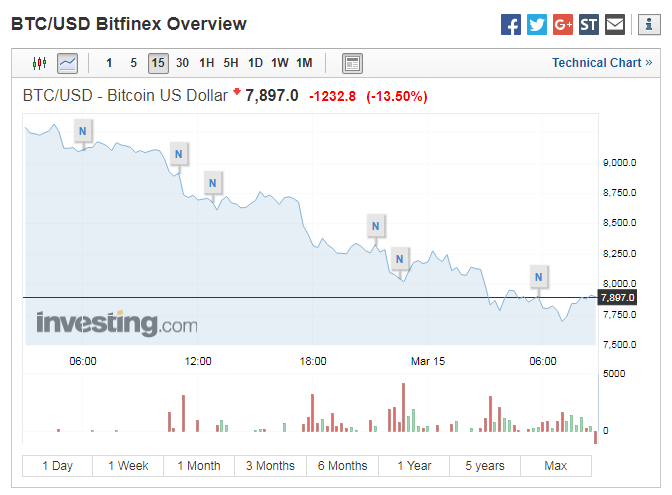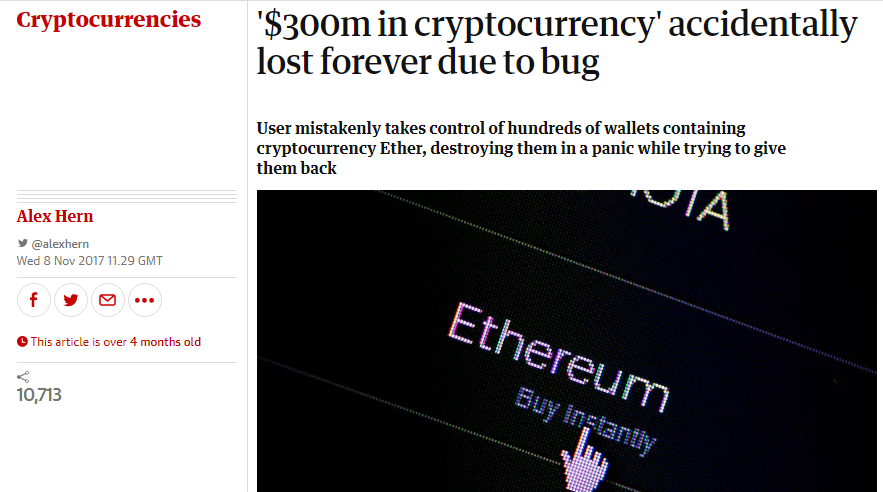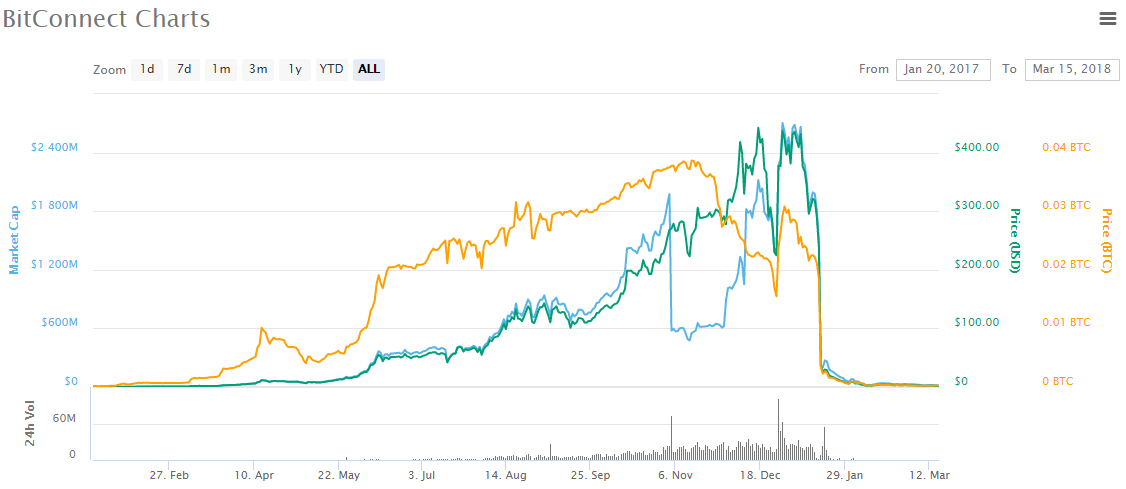Why Trading in Bitcoin or Other Cryptocurrencies is Playing with Fire
You're probably aware that investing in bitcoin is risky in general, but let's take a look at the specific reasons why you could get burned.


Profit and prosper with the best of Kiplinger's advice on investing, taxes, retirement, personal finance and much more. Delivered daily. Enter your email in the box and click Sign Me Up.
You are now subscribed
Your newsletter sign-up was successful
Want to add more newsletters?

Delivered daily
Kiplinger Today
Profit and prosper with the best of Kiplinger's advice on investing, taxes, retirement, personal finance and much more delivered daily. Smart money moves start here.

Sent five days a week
Kiplinger A Step Ahead
Get practical help to make better financial decisions in your everyday life, from spending to savings on top deals.

Delivered daily
Kiplinger Closing Bell
Get today's biggest financial and investing headlines delivered to your inbox every day the U.S. stock market is open.

Sent twice a week
Kiplinger Adviser Intel
Financial pros across the country share best practices and fresh tactics to preserve and grow your wealth.

Delivered weekly
Kiplinger Tax Tips
Trim your federal and state tax bills with practical tax-planning and tax-cutting strategies.

Sent twice a week
Kiplinger Retirement Tips
Your twice-a-week guide to planning and enjoying a financially secure and richly rewarding retirement

Sent bimonthly.
Kiplinger Adviser Angle
Insights for advisers, wealth managers and other financial professionals.

Sent twice a week
Kiplinger Investing Weekly
Your twice-a-week roundup of promising stocks, funds, companies and industries you should consider, ones you should avoid, and why.

Sent weekly for six weeks
Kiplinger Invest for Retirement
Your step-by-step six-part series on how to invest for retirement, from devising a successful strategy to exactly which investments to choose.
The two biggest players for digital advertising may have finally halted the blockchain hype.
In March 2018, Google updated its financial services advertising policy. With these changes, ads for “Cryptocurrencies and related content (including but not limited to initial coin offerings, cryptocurrency exchanges, cryptocurrency wallets, and cryptocurrency trading advice)” will no longer be displayed in Google's ad network. Facebook had already banned cryptos and ICOs (initial coin offerings) from its platform in January.
How did the market react?
From just $107.88 $24.99 for Kiplinger Personal Finance
Become a smarter, better informed investor. Subscribe from just $107.88 $24.99, plus get up to 4 Special Issues

Sign up for Kiplinger’s Free Newsletters
Profit and prosper with the best of expert advice on investing, taxes, retirement, personal finance and more - straight to your e-mail.
Profit and prosper with the best of expert advice - straight to your e-mail.
Almost all cryptocurrencies lost 10% to 20% in value during the 24 hours after the latest announcement. This includes all coins with the biggest market cap (Bitcoin, Ethereum, Ripple, Bitcoin Cash, Litecoin) and also those that were expected to gain a lot of momentum in 2018 (NEO, IOTA, OmiseGO).

This clearly shows one of the risks you take when trading with cryptocurrencies: It's an extremely volatile market, and depending on when you buy, you may experience considerable losses within a couple of days or even hours.
Of course, the opposite situation has also occurred. At one point in 2017 the value for bitcoin soared more than 1,500% since the beginning of the year. People suddenly became millionaires, because they invested in Bitcoin at the right time — before the real hype started.
I think we can all agree that trading cryptos is not for the faint of heart. Apart from extreme volatility, what are some of the other potential risks associated with dabbling in cryptocurrencies?
Total Loss & Market Manipulation
First, digital currencies can suddenly become worthless if investor interest dissipates. In fact, bitcoin discloses this warning in its FAQ. Even Deutsche Bank has listed a bitcoin crash as one of the risks to markets in 2018.
Some coin exchanges allow you to set stop-loss orders, which could be considered to help deal with that risk. With a stop-loss order, you automatically sell at a pre-determined lower price to avoid losing all your money. Unfortunately, there’s a problem with that strategy: market manipulation.
Using stop-loss orders is common practice in the stock market. For cryptocurrencies; however, they might not work as intended because the market is unregulated. Investors who hold large amounts of coins can easily manipulate the market by selling their coins with the goal to trigger the stop-losses. Afterward, they can simply repurchase their coins at a lower price and pocket the difference.
Technical Issues
In November 2017 the Guardian published an article with the headline ''$300m in cryptocurrency' accidentally lost forever due to bug.” Author Alex Hern outlined that more than $300 million invested in Ether (Ethereum's coin) was locked up in a number of digital multi-signature wallets and later accidentally destroyed by a user in a series of bugs. Neither the coins nor the money could be recovered.
Ironically, a hacker did not cause this issue. It was a technical issue, and certainly not first time such an incident has occurred.

Hacker Attacks
It seems like the rise of cryptocurrencies was exactly what hackers have been waiting for all their lives.
In order to keep digital currency coins secure, they are encrypted, which makes a lot of sense. The problem is that a coin does not have your name written on it. The encrypted code identifies the currency itself, but not the owner. This means that whoever holds the code automatically becomes the owner, even if the code was stolen.
Above that, once an exchange or a digital wallet got hacked and all coins are gone, it's very hard or even impossible to retrieve them.
These are some of the attacks that have happened in the last years:
- 2014: The world's largest Bitcoin exchange, Mt. Gox, went into bankruptcy after being hacked with $460 million (approx. 740,000 Bitcoins) stolen.
- March 4, 2014: 12.3% of the BTC on Poloniex was stolen.
- Aug. 2, 2016: 119,756 Bitcoins were stolen from bitfinex due to a security breach.
- Jan. 27, 2018: Cryptocurrency exchange Coincheck (Tokyo) said that the day before a hacker had stolen about 58 billion yen ($532 million) worth of its holdings in NEM.
Risks Associated with Coin Exchanges
Apart from getting hacked, these are some of the risks associated with coin exchanges:
1. They May Disappear
GBL, a bitcoin exchange based in China, went offline for no apparent reason in November 2013. Later it became clear that GBL's operators ran off with $4.1 million worth in Bitcoin.
Another example for a coin exchange that simply disappeared is MyCoin, with $387 million stolen in investor funds.
2. They May Get Seized
In July 2017, Bitcoin exchange platform BTC-e was seized by the FBI due to money-laundering crimes.
3. They May Disable/Freeze Your Account
This has happened to Coinbase users.
Impending Government Regulations
In theory, governments can make trading cryptocurrencies — such as bitcoin — illegal, which is the case in Algeria, Bolivia, Ecuador, Bangladesh, Nepal and Macedonia, but that’s not set in stone. Investors should monitor the situation, because just as trading cryptocurrencies is dynamic, the regulations are as well.
The Chinese government has announced that it will eventually close down domestic coin exchanges.
Investor Sentiment
For billionaire investor Mark Cuban, bitcoin's value “is a function of supply and demand. It doesn’t really do anything else.” Chances are that investor sentiment drops over time, as there are a number of altcoins that have many more purposes than peer-to-peer payments alone. Take Ethereum as an example. (Ethereum is an open software platform that uses blockchain technology to help develop and take advantage of decentralized applications. The bitcoin blockchain helps monitor ownership of digital currency (bitcoins), whereas the Ethereum blockchain supports the programming code of decentralized applications.) Or they bait crypto enthusiasts with lower transaction fees.
Ponzi Schemes
The BitConnect token was priced at more than $400 before BitConnect shut down after being accused of running a Ponzi scheme.
Since then the token price has plummeted:

What Financial Authorities Say
The Financial Industry Regulatory Authority (FINRA), a not-for-profit organization authorized by Congress, aims to protect investors by making sure that the financial industry “operates fairly and honestly.”
In 2014 FINRA published an Investor Alert listing the risks that come with buying, selling and using cryptocurrencies, and bitcoin in particular. Apart from the fact that exchanges can be hacked and coins stolen, FINRA reminded investors that cryptocurrencies are not legal tender. If no business or individual accepts them for payment, they eventually become worthless. FINRA also warned of bitcoin-related scams.
Jay Clayton, chairman of the U.S. Securities and Exchange Commission (SEC), stated in December 2017 that “to date no initial coin offerings have been registered with the SEC.”
Clayton also pointed out that if the trading activity happens on platforms outside the U.S., it may not be possible for regulators, such as the SEC, to pursue bad actors and recover stolen or lost investment funds.
The moral of the story: It’s important to understand that trading cryptocurrencies can be a high risk-reward game. Don’t play with fire.
Profit and prosper with the best of Kiplinger's advice on investing, taxes, retirement, personal finance and much more. Delivered daily. Enter your email in the box and click Sign Me Up.

Marguerita M. Cheng is the Chief Executive Officer at Blue Ocean Global Wealth. She is a CFP® professional, a Chartered Retirement Planning Counselor℠ and a Retirement Income Certified Professional. She helps educate the public, policymakers and media about the benefits of competent, ethical financial planning.
-
 The New Reality for Entertainment
The New Reality for EntertainmentThe Kiplinger Letter The entertainment industry is shifting as movie and TV companies face fierce competition, fight for attention and cope with artificial intelligence.
-
 Stocks Sink With Alphabet, Bitcoin: Stock Market Today
Stocks Sink With Alphabet, Bitcoin: Stock Market TodayA dismal round of jobs data did little to lift sentiment on Thursday.
-
 Betting on Super Bowl 2026? New IRS Tax Changes Could Cost You
Betting on Super Bowl 2026? New IRS Tax Changes Could Cost YouTaxable Income When Super Bowl LX hype fades, some fans may be surprised to learn that sports betting tax rules have shifted.
-
 The 4 Estate Planning Documents Every High-Net-Worth Family Needs (Not Just a Will)
The 4 Estate Planning Documents Every High-Net-Worth Family Needs (Not Just a Will)The key to successful estate planning for HNW families isn't just drafting these four documents, but ensuring they're current and immediately accessible.
-
 Love and Legacy: What Couples Rarely Talk About (But Should)
Love and Legacy: What Couples Rarely Talk About (But Should)Couples who talk openly about finances, including estate planning, are more likely to head into retirement joyfully. How can you get the conversation going?
-
 How to Get the Fair Value for Your Shares When You Are in the Minority Vote on a Sale of Substantially All Corporate Assets
How to Get the Fair Value for Your Shares When You Are in the Minority Vote on a Sale of Substantially All Corporate AssetsWhen a sale of substantially all corporate assets is approved by majority vote, shareholders on the losing side of the vote should understand their rights.
-
 How to Add a Pet Trust to Your Estate Plan: Don't Leave Your Best Friend to Chance
How to Add a Pet Trust to Your Estate Plan: Don't Leave Your Best Friend to ChanceAdding a pet trust to your estate plan can ensure your pets are properly looked after when you're no longer able to care for them. This is how to go about it.
-
 Want to Avoid Leaving Chaos in Your Wake? Don't Leave Behind an Outdated Estate Plan
Want to Avoid Leaving Chaos in Your Wake? Don't Leave Behind an Outdated Estate PlanAn outdated or incomplete estate plan could cause confusion for those handling your affairs at a difficult time. This guide highlights what to update and when.
-
 I'm a Financial Adviser: This Is Why I Became an Advocate for Fee-Only Financial Advice
I'm a Financial Adviser: This Is Why I Became an Advocate for Fee-Only Financial AdviceCan financial advisers who earn commissions on product sales give clients the best advice? For one professional, changing track was the clear choice.
-
 I Met With 100-Plus Advisers to Develop This Road Map for Adopting AI
I Met With 100-Plus Advisers to Develop This Road Map for Adopting AIFor financial advisers eager to embrace AI but unsure where to start, this road map will help you integrate the right tools and safeguards into your work.
-
 The Referral Revolution: How to Grow Your Business With Trust
The Referral Revolution: How to Grow Your Business With TrustYou can attract ideal clients by focusing on value and leveraging your current relationships to create a referral-based practice.